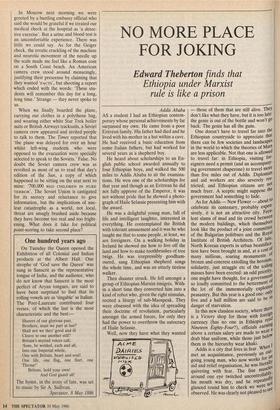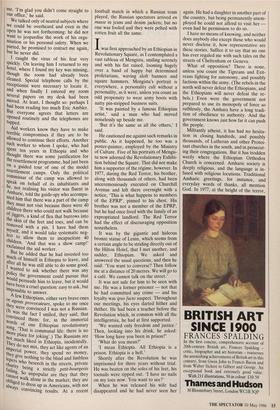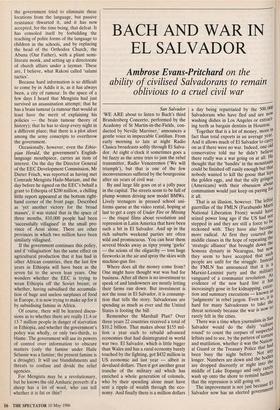NO MORE PLACE FOR JOKING
Edward Theberton finds that
Ethiopia under Marxist rule is like a prison
Addis Ababa AS a student I had an Ethiopian contem- porary whose personal achievements by far surpassed my own. He came from a poor Eritrean family. His father had died and he lived with his mother in a hut within a cave. He had received a basic education from some Italian fathers, but had worked for several years as a shepherd boy.
He heard about scholarships to an En- glish public school awarded annually to four Ethiopian boys, and walked the 500 miles to Addis Ababa to sit the examina- tions. He won one of the scholarships for that year and though as an Eritrean he did not fully approve of the Emperor, it was not without pride that he showed a photo- graph of Haile Selassie presenting him with the award.
He was a delightful young man, full of life and intelligent laughter, interested in everything. He contemplated the British with tolerant amusement and it was he who taught me that to some people, at least, we are foreigners. On a walking holiday in Ireland he showed me how to live off the land and how to make toothbrushes of tree twigs. He was irrepressibly goodhum- oured, sang Ethiopian shepherd songs the whole time, and was an utterly tireless walker.
Then disaster struck. He fell amongst a group of Ethiopian Marxist émigrés. With- in a short time they converted him into a kind of robot who, given the right stimulus, recited a liturgy of sub-Maospeak. They were obsessed with the idea of spreading their doctrine of revolution, particularly amongst the armed forces, for only they had the power to overthrow the autocracy of Haile Selassie.
Well, now they have what they wanted — those of them that are still alive. They don't like what they have, but it is too late: the genie is out of the bottle and won't g° back. The genie has all the guns.
One doesn't have to travel far into the Ethiopian countryside to appreciate that there can be few societies and landscapes in the world to which the theories of Marx are less applicable. Not that one is allowed to travel far: in Ethiopia, visiting for- eigners need a permit (and an accompanY- ing government chaperone) to travel more than five miles out of Addis. Diplomats and aid workers are also severely res- tricted; and Ethiopian citizens are ot much freer. A sceptic might suppose the government had something to hide. As for Addis — New Flower — about to celebrate its centenary, • probably expert- sively, it is not an attractive city. Feed" lent slums of mud and tin crowd between the modern buildings, which themselves look like the product of a joint committee of the Bulgarian politburo and the Royal Institute of British Architects. Of late, North Korean experts in urban beautifica- tion have been brought in and, at a cost of many millions, soaring monuments of bronze and concrete extolling the heroism' solidarity, just struggle etc of the toiling masses have been erected: an odd prioritY, one might have thought, for a government, so loudly committed to the betterment ot. the lot of the immemorially exploited peasantry. But this year is a good one: on five and a half million are said to be jo danger of starvation. In this new classless society, where there is a Victory shop for those with foreign, currency (has no one in Ethiopia reau Nineteen Eighty-Four?), officials earning above a certain salary are made to wear 3 drab blue uniform, while those just below them in the hierarchy wear khaki. I Addis is a city that lives in fear. W-e hn met an acquaintance, previously an 01.1, going young man, who now works for a." aid and relief organisation, he was literal*" quivering with fear. The fine muscles around one eye twitched uncontrollabT his mouth was dry, and he repeatelt glanced round him to check we were nee observed. He was clearly not pleased to s me. 'I'm glad you didn't come straight to our office,' he said.
We talked only of neutral subjects where we could be overheard and even in the Open he was not forthcoming: he did not want to jeopardise the work of his orga- nisation or his personal safety. When we Parted, he promised to contact me again, but he never did.
I caught the virus of his fear very quickly. On leaving him I returned to my hotel, where I found my key was missing, though the room had already been cleaned. Special telephone calls by the receptionist were necessary to locate it, and when finally I entered my room several papers on my desk had been moved. At least, I thought so: perhaps I had been reading too much Eric Ambler. But everyone agrees that letters are Opened routinely and the telephones are tapped.
Aid workers know they have to make terrible compromises if they are to be allowed to continue their efforts. Another such worker to whom I spoke, who had Spent ten years in Ethiopia and who thought there was some justification for the resettlement programme, had just been °II a guided tour of one of the model resettlement camps. Only the political commissar of the camp was allowed to speak on behalf of its inhabitants and he, not realising his visitor was fluent in Amharic, told the guide-spy who accompa- nied him that there was a part of the camp they must not visit because there were 40 Children there who could not walk because 0f Jiggers, a kind of flea that burrows into the skin of the feet and toes, and can be removed with a pin. I have had them myself, and it would take systematic neg- lect to allow them to incapacitate 40 Children. 'And that was a show camp!' exclaimed the aid worker. But he added that he had invested too much of himself in Ethiopia to leave, and a_ fter all he was still able to do some good. 1 Wanted to ask whether there was any Policy the government could pursue that !vould persuade him to leave, but it would have been a cruel question: easy to ask, but impossible to answer. A few Ethiopians, either very brave ones ,u,r agents provocateurs, spoke to me once Lacy were convinced I was not a Russian. (It was the fact I smiled, they said, that convinced them: for, in the immortal Words of one Ethiopian revolutionary s°ng, 'That is communal life: there is no More place for joking'.) The Russians are not much liked in Ethiopia, incidentally. They do not mix, they act like agents of an they power, they spend no money, ,"eY give nothing to the blind and limbless Charity who beseech in the streets, private fn.aTity being a strictly petit-bourgeois etailing. So unpopular are they that they cannot walk alone in the market; they are iged to dress up as Americans, with not alvvays convincing results. At a recent football match in which a Russian team played, the Russian spectators arrived en masse in jeans and denim jackets; but no one was fooled and they were pelted with rotten fruit all the same.
Iwas first approached by an Ethiopian in Revolutionary Square, as I contemplated a vast tableau of Mengistu, smiling serenely and with his fist raised, looming hugely over a band of happy but determined proletarians, waving aloft banners and square hammers. Mengistu's portrait is everywhere, a personality cult without a personality, as it were, unless you count an odd propensity to wear army boots with natty pin-stripped business suits.
'It was painted by a famous Ethiopian artist,' said a man who had moved noiselessly up beside me.
Tut it's the same as all the others,' I said.
He cautioned me against such remarks in public. As it happened, he too was a poster-painter, employed by the Ministry of Culture. Five of his portraits of Mengis- tu now adorned the Revolutionary Exhibi- tion behind the Square. That did not make him a supporter of the regime, however. In 1977, during the Red Terror, his brother, along with thousands of others, had been unceremoniously executed on Churchill Avenue and left there overnight with a notice, 'This is what happens to members of the EPRP', pinned to his chest. His brother was not a member of the EPRP, but he had once lived with the family of an expropriated landlord. The Red Terror had the effect of discouraging opposition nonetheless.
It was by the gigantic and hideous bronze statue of Lenin, which seems from a certain angle to be striding directly out of the Hilton Hotel, that I met another, and sadder, Ethiopian. We asked and answered the usual questions, and then he said: 'You want to converse? Then follow me at a distance of 20 metres. We will go to a café. We cannot talk on the street.'
It was not safe for him to be seen with me. He was a former prisoner — not that he had committed any crime — and his loyalty was ipso facto suspect. Throughout our meetings, his eyes darted hither and thither. He had been a teacher before the Revolution which, in common with all the intelligentsia, he had at first supported. 'We wanted only freedom and justice.' Then, looking into his drink, he asked: 'How long have you been in prison?'
'What do you mean?' 'I mean Ethiopia. All Ethiopia is a prison. Ethiopia is a hell.' Shortly after the Revolution he was imprisoned for three years without trial. He was beaten on the soles of his feet, his toenails were ripped out. 'I have no nails on my toes now. You want to see?' When he was released his wife had disappeared and he had never seen her again. He had a daughter in another part of the country, but being permanently unem- ployed he could not afford to visit her — even had he permission to do so.
I have no means of knowing, and neither does anybody else except those who would never disclose it, how representative are these stories. Suffice it to say that no one has ever regaled me with such tales on the streets of Cheltenham or Geneva.
What of opposition? There is none, unless you count the Tigreans and Erit- reans fighting for autonomy, and possibly factions within the army. (The rebels in the north will never defeat the Ethiopians, and the Ethiopians will never defeat the re- bels.) Even were the government not prepared to use its monopoly of force so ruthlessly, the Amhara have a long tradi- tion of obedience to authority. And the government knows just how far it can push the people.
Militantly atheist, it has had no hesita- tion in closing hundreds, and possibly thousands, of Lutheran and other Protes- tant churches in the south, and in persecut- ing their congregations. But it has trodden warily where the Ethiopian Orthodox Church is concerned. Amharic society is deeply religious, and the language is in- fused with religious locutions. Traditional Amharic greetings, for instance, and everyday words of thanks, all mention God. In 1977, at the height of the terror, the government tried to eliminate these locutions from the language, but passive resistance thwarted it, and it has now accepted, for the time being, that defeat. It has consoled itself by forbidding the teaching of polite forms of the language to children in the schools, and by replacing the head of the Orthodox Church, the Abuna (Our Father), with a pliant semi- literate monk, and setting up a directorate of church affairs under a layman. These are, I believe, what Rakosi called 'salami tactics'.
Because hard information is so difficult to come by in Addis it is, as it has always been, a city of rumour. In the space of a few days I heard that Mengistu had just survived an assassination attempt; that he has a brain tumour (a rumour that would at least have the merit of explaining his policies — the brain tumour theory of history); that he has to sleep every night in a different place; that there is a plot afoot among the army conscripts to overthrow the government.
Occasionally, however, even the Ethio- pian Herald, the government's English- language mouthpiece, carries an item of interest. On the day the Director General of the EEC Development Commission, Mr Dieter Frisch, was reported as having met Comrade Mengistu Haile-Mariam, and the day before he signed on the EEC's behalf a grant to Ethiopia of $200 million, a chilling little report appeared at the bottom right- hand corner of the front page. Described as 'yet another victory for the broad masses', it was stated that in the space of three months, 810,000 people had been 'successfully villagised' in the small pro- vince of Arssi alone. There are other provinces in which two million have been similarly villagised.
If the government continues this policy, and if `villagisation' has the same effect on agricultural production that it has had in other African countries, then the last few years in Ethiopia will have been as the seven fat to the seven lean years. One wonders whether the EEC is trying to wean Ethiopia off the Soviet breast; or whether, having subsidised the accumula- tion of huge and useless surpluses of food in Europe, it is now trying to make up for it by subsidising famine in Africa.
Of course, there will be learned discus- sions as to whether there are really 11.4 or 13.7 million people in danger of starvation in Ethiopia, and whether the government's policy was wholly, or only two-thirds, to blame. The government will use its powers of control over information to obscure matters (only the famine under Haile Selassie was a famine; the present famine is a drought). It will use blandishments and threats to confuse and divide the relief agencies.
For Mengistu may be a revolutionary, but he knows the old Amharic proverb: if a sheep has a lot of wool, who can tell whether it is fat or thin?




























































 Previous page
Previous page